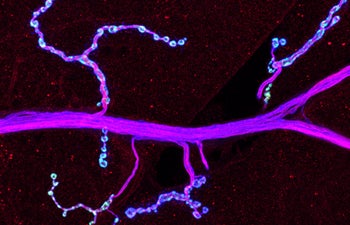Dion Dickman Wins Award to Fund Research on Neurobiology of Aging
Dion Dickman, assistant professor of biological sciences in USC Dornsife, has received a 2012 New Scholar Award in Aging from the Ellison Medical Foundation.
Over the next four years, the $400,000 award will fund Dickman’s research into the mechanisms of synaptic plasticity in the nervous system during the aging process.
The New Scholar Award in Aging provides support for newly independent researchers. The award enables young scientists who show outstanding promise in aging research to staff their laboratories, collect preliminary data and launch research programs that can attract additional support from other sources.
“It’s an amazing opportunity to establish my new and independent research program right off the bat,” Dickman said. “This award provides acknowledgement, support and opportunities for interactions with a new community of exceptional researchers from across the country.”
“This is terrific news for Dion and for USC,” said Douglas Capone, chair of the USC Dornsife Department of Biological Sciences. “The award from Ellison will enable him to rapidly jump-start his independent research program. Dion just arrived in January and this award provides affirmation of what a superb catch he was.”
Dickman joined USC Dornsife in January 2012 after studying synapse function and plasticity as a postdoctoral researcher at the University of California, San Francisco.
At USC Dornsife, he will continue his research into synapse development, function and plasticity. In particular, Dickman’s lab looks at how those processes maintain neuronal communication within normal physiological ranges, known as homeostatic synaptic plasticity, as well as how dysfunction in those pathways contribute to the etiology of neuropsychiatric diseases.

A neuromuscular synapse in Drosophila. Image by Wanlin Guo.
Using the fruit fly Drosophila melanogaster as a model system, Dickman will put his award to use investigating the genes that establish stable synaptic function and explore how these processes break down as the brain ages. Dysfunctions in synaptic homeostasis are thought to contribute to neurological disorders such as schizophrenia and epilepsy, and Dickman will look at how cognitive decline and other impairments may be associated with changes in synaptic function.
Dickman said the award comes at a crucial moment in his career and will be central to establishing his laboratory at USC Dornsife.
“I want to create a dynamic research environment using advanced approaches and recruit top-notch, enthusiastic students and researchers,” he said.
The Ellison Medical Foundation supports basic biomedical research, with a focus on understanding how humans and other organisms age, and defining the fundamental biological mechanisms that prevent age-related diseases and disabilities. The foundation aims to stimulate new, creative research approaches often not funded by traditional sources or U.S. research funding programs.
Dickman is looking forward to being part of a larger intellectual community of researchers investigating the aging process from a variety of disciplines. The Ellison Medical Foundation hosts an annual colloquium for senior scholar and new scholar award recipients to share their research with one another.
“This award not only brings my research program into a new and exciting direction, but also connects me with great researchers from diverse fields, enabling cross-pollination of our ideas.”
Additionally, Dickman said the award will provide him a greater opportunity to forge new relationships and collaborations with researchers on aging and neuroscience within USC.
“It’s really great to be part of the vision that the entire USC community has for research,” he said.